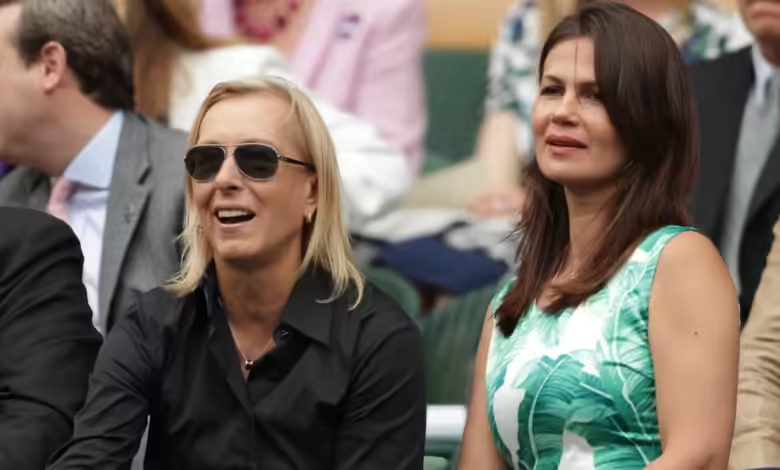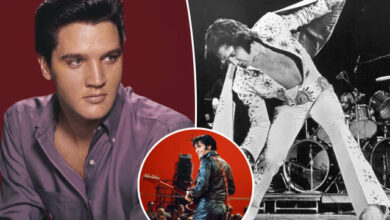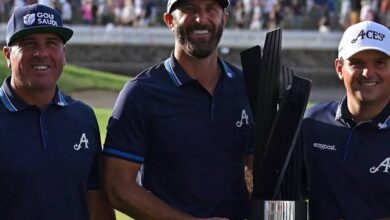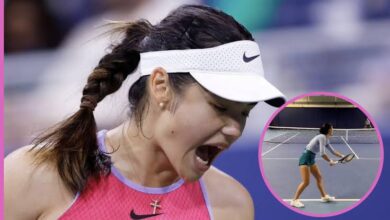Martina Navratilova: ‘I’ve always tried to do the right thing rather than the popular thing’
She’ll be back in the commentary box this week, but before that she talks to fellow feminist activist Julie Bindel about the ban on Russian players, mental health in tennis and why this year’s Wimbledon crowd will be very loud

Martina Navratilova, tennis superstar and human rights activist, is sitting in her Miami home, the sun streaming in through the open door behind her. We are speaking on Zoom with a background chorus of barking dogs and chirping parrots – the loudest being a black-legged caique named Mango. “She makes sounds like the alarm system,” she says, laughing, “so I think a fire is going off when it’s just Mango talking.” Navratilova won the Wimbledon women’s singles title a record nine times, including six in a row from 1982-87.
In all, she won 59 slam titles in singles, doubles and mixed doubles, more than any player in history. In 2006 she won the mixed doubles at the US Open just before her 50th birthday – and 32 years after her first trophy at a major.
But since retiring from tennis, she has hardly been quiet. A formidable activist, she spends much of her time advocating for a range of causes, from equal rights to Aids research. She has spoken out against immigration control and racism in the US.
I first met Navratilova in 2010 when I interviewed her in London about her commitment to lesbian and gay rights. More recently we were in touch about the campaign for the release from prison in Tennessee of Cyntoia Brown, given a life sentence in 2004 at the age of 16 for defending herself against a sex buyer whom she feared would kill her.
The year after coming out, Navratilova beat her arch-rival Chris Evert to become the 1982 Wimbledon women’s champion. The press focused more on her sexuality than her achievements on court: she lost millions of dollars in sponsorship deals but became a lesbian role model. Navratilova will be back in the UK this week commentating for the BBC during the Wimbledon fortnight.
She still pulls no punches, personally or politically, and our talk ranges from tennis rivalries, coming out and Joe Biden to abortion, travel and food. Whether it is about gun control, sexism, or the war in Ukraine, Navratilova has something to say.
Navratilova is known as a proud LGBT ally, but since questioning whether it is fair to include trans women in female-only teams she has come in for criticism, including threats and defamatory slurs. I ask her why she has spoken out publicly, despite the toxicity of the debate. She explains that trans women playing in women’s sport have a “built-in advantage” and sees the answer as “more inclusion on the men’s side”. “The female sport category has to be protected,” she argues. “The male windpipe is 25 to 50% larger than the female airway, which means they can get more oxygen. And that doesn’t shrink when you take hormones.” Like Sharron Davies, the British Olympic swimmer, she advocates for an “all-female and then an open category where [men and] trans people can compete”.
This stance, reasonable as it may seem to many, has caused her a great deal of difficulty with some trans rights activists. “You know me,” she says, “I’ve always tried to do the right thing rather than the popular thing.”
Speaking out on this issue has cost Navratilova her connection with Athlete Ally, an organisation she co-founded in 2011 that supports LGBT athletes. She was dropped as an advisory board member and ambassador two years ago. The reason? Alleged transphobia. “I had a transgender coach [Renée Richards] for fuck’s sake,” she tells me, “but I am supposed to be transphobic!”
She is also outspoken on the state of the US criminal justice system, and tells me she is in favour of emptying the prisons of all but those who pose a danger to others. “We lock people up for being poor in this country,” she says. “We are the most incarcerated country in the world. I would save prison for those, usually men, that rape and harm women and kids.”
At one moment she disappears from my screen, reappearing a couple of minutes later holding some fresh mangoes from her garden. As she takes a chunk from one, “Delicious! So sweet!”
Being an out lesbian was not easy for Navratilova in the early 1980s and even 90s. In 1990, when Navratilova broke the record for winning the most Wimbledon titles, Margaret Court, who had won multiple slams in the 60s and 70s, said she would have preferred “someone at the top who the younger players can look up to. It’s very sad for children to be exposed to homosexuality. Martina is a nice person. Her life has just gone astray.” And yet Navratilova was known for her support and mentoring of women who felt compelled to remain in the closet.
How have attitudes changed? Her children, aged 16 and 20, have gay friends and for them “it’s a non-issue,” which provides great satisfaction for Navratilova. She says: “We’ve been fighting for decades, so it’s peculiar that in some places within society, nobody cares, but in others like male sports, they’re terrified of coming out.” I ask her views on Jake Daniels, the UK’s first active male professional footballer to come out publicly as gay in more than 30 years. She is not overly impressed. “In the 1980s, it was nasty or even dangerous to come out, but not now. Yet they’re still hiding… It’s 2022 for God’s sake.”
On the subject of Joe Biden, she says, “He’s such a nice man, and he means well”, but the Democrats on the whole come in for a serious telling-off. “They are like a little hummingbird, they drift from flower to flower to flower,” she says. “They always play defence, and it drives me crazy. We should be on offence. At the end, nothing gets done.” She wishes they were more like she was on the tennis court: focused, intentional, with their eyes on the prize. “The Republicans are more organised with their talking points,” she says. “They can beat a horse to death for a day or a week, however long it takes to get it embedded in people’s minds how bad it is.” I couldn’t help but think of her 74-match winning streak in 1984, unsurpassed by anybody since. She is a woman who knows how to dig in.
We move on to the most pressing issues facing the US, which for Navratilova include abortion rights and gun control. “There is a mass shooting on a daily basis,” she says, visibly angry. “And abortion has gone completely off the [Democrats’] radar. Republicans have been working to overturn it since Roe v Wade and now they’ve won, it’s happening, it’s only a matter of how far it goes.” Her frustration with the Democratic response is intense too: “It’s like the Democrats are waiting until the shit hits the fan. I would be screaming from the rooftops if I was in a position of power.”
Navratilova used to hunt game but gave it up, along with meat, 20 years ago. She favours regulating rather than banning guns. “I wouldn’t take people’s guns away,” she says, “I want to incentivise them to hand them over, like they have done in Australia.” Drown gun owners in paperwork, she says: “[Then] we will see how badly you really have to have the assault rifle whose only purpose is to kill as many people as quickly as possible.”
So many roads for Navratilova lead back to tennis, so inevitably we arrive at the controversy of Russian and Belarusian players being banned from Wimbledon because of Russia’s invasion of Ukraine. The Russian player Anastasia Pavlyuchenkova, last year’s French Open finalist, who has called publicly for the war to stop, will be excluded from the competition, alongside current men’s No 1 Daniil Medvedev and No 8, Andrey Rublev. As far as she is concerned, the ban is wrong, and the professional sport’s governing bodies are also wrong to withhold ranking points from all players competing at Wimbledon. Amid concerns that players will withdraw from Wimbledon if they can’t accrue points, Navratilova has little sympathy for them. “I would rather play with fans and no points,” she says.
I’m not belittling them, but we didn’t have the option of having any mental issues, because we were too busy
Another giant of tennis and fighter for equality, Billie Jean King, once said that “pressure is a privilege”. Does Navratilova agree? In some senses, yes, she says: “If you don’t have any pressure, it means you haven’t done shit yet.”
But what about the changing nature of stress in the modern sporting world? “If social media is your biggest problem,” she says, “you’ve got it good, because you have an option of staying away from it.” Having left her country, Czechoslovakia – then under Soviet rule – on a “one-way ticket” to claim asylum in the US and having struggled at first, playing without a coach for six years, and renting her own vehicle to drive herself to tournaments, Navratilova is aware of the physical hardships of professional sport. She also has great sympathy for players who struggle psychologically, saying: “The mental issues are real. I’m not belittling them at all, but it’s like we didn’t have the option of having any mental issues, because we were too busy.”
Of Naomi Osaka, the young player who has brought mental health in tennis to the forefront, she says: “Some can handle it better than others. Osaka, she isn’t playing at all, but my God, we want her to play, because she’s such a talent, we want her on the tour.”
As for British player Emma Raducanu, she needs to spend time in the gym and improve her fitness in order to prevent her sustaining injuries, Navratilova thinks. “She’s not been fit for a while. She got through the US Open but loses three-set matches because she runs out of steam.” Ash Barty may have retired at 25, but Navratilova doesn’t think that means tennis as a career is becoming shorter. Many players, including Serena Williams, are still playing at 40, and “I played doubles in my late 40s”.
Navratilova looks back fondly at the rivalries in the women’s game during her heyday: “Chris [Evert] and I, that’s a rivalry for the ages in terms of longevity,” she says. She worries that great rivalries have not been so much in evidence in the past 10 years. “The women fluctuate a lot more with their ability,” she says, “and that means you don’t get the rivalry because they don’t play one another enough at the top of the game, and you need that. In tennis, you are only as good as the ball you are hitting – you can’t hit great shots unless you are forced to hit great shots, so you need those rivalries.” She is, however, optimistic at the way the women’s game is shaping up. “Hopefully, we are heading that way again.”
What is the fabric of her life like nowadays? “To relax I have my dogs, paddle boarding, and I love to ski,” she says. Navratilova’s wife is the Russian former model Julia Lemigova, a star of reality TV series The Real Housewives of Miami. “I love to travel, but Julia doesn’t so much, so I have to do that on my own or bring a friend. I want to go to Antarctica to see a blue whale, that is a dream of mine. Alaska, Machu Picchu, Galápagos, Madagascar, I really want to travel round south-east Asia… I love tasting new things, I am a total foodie.”
What does the future hold? Navratilova has just signed up to a UK-based project that will focus on the wellbeing and needs of lesbians because, in recent years, she says, “pretty much everyone else in the LGBTQ rainbow is favoured over us. I’m thrilled to be able to take an ambassadorial role. I’ve always fought for lesbians and think it’s harder for women than it is for men in so many ways to come out as gay.
“I’d like to say to young women that it’s OK to be a lesbian and to embrace who you are,” she adds. “Everybody needs a lifeline when they feel alone in the world, they need to be able to get support. So maybe we can be there for young lesbians growing up. I don’t want them to feel scared.” With her skill at saying what so many are thinking, would she ever run for office? “No,” she says. “I cannot deal with the hypocrisy and the double dealing that you have to do to get ahead. That’s just not me.”
Looking ahead to her trip to London, Navratilova reels off several restaurants she can’t wait to visit. Wimbledon remains her true love when it comes to tennis tournaments, and this year promises to be a good one. Last year she had to wave to friends such as Novak Djokovic from a distance, with Covid restrictions still in place.
“The crowd is going to be crazy this year I reckon,” she says. “We all took so much for granted and now it’s like we appreciate more of what we have again. I expect a very big crowd, much louder than they’ve been in the past.”
Perhaps for the first time in her life, Navratilova has a little time on her hands to decide what’s next. The two children she raised with Lemigova have left home, and she is looking for a new project. “We have an empty nest. The kids have been out of here for about six months, so I’m trying to figure out what kind of project can I make happen in five years, 10 years, because I don’t know how many years I have left. I’m hoping for 20-plus.”
Will there ever be another female player who reaches her heights? “I can’t be tooting my own horn,” she says, “but just say I hope there will be more players who treat the net as a friend.”



